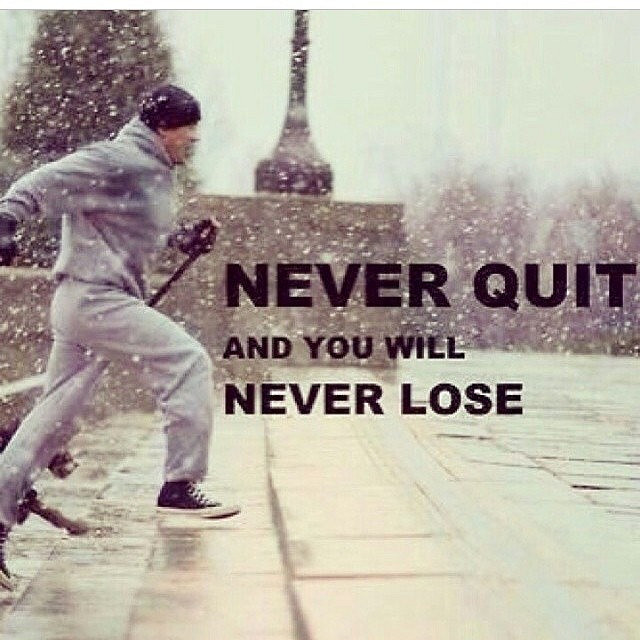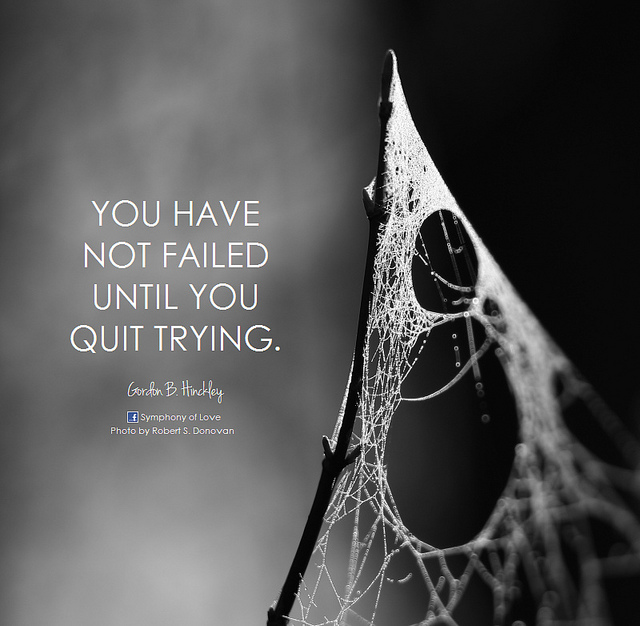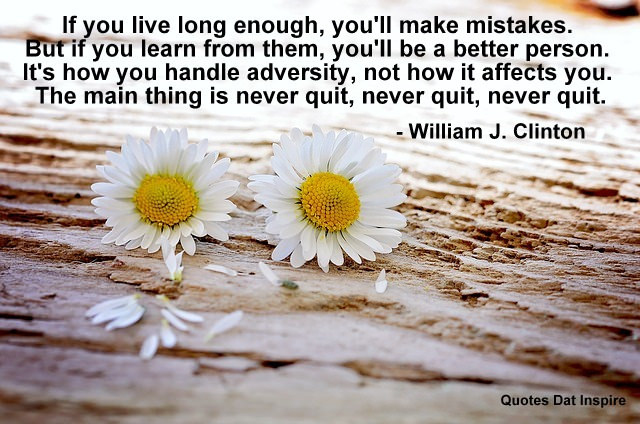Winners Always Quit, and Quitters Always Win
Photo Credit: https://www.flickr.com/photos/jeffdjevdet/
“Winners never quit, and quitters never win,” is the way the old saying goes.
But what if I argued you can also say the exact opposite?
The culture of achievement revolves around “doing” - do this to succeed, you only win if you do this, etc. The problem is, our gung-ho, high-positivity self-improvement culture focuses on never quitting. Always grind it out. Always give it 100%. Never back down. Fight to the finish. We don’t talk about what we shouldn’t do, and we refuse to accept that there are more options than "always" or "never".
I did a quick google search for the words "never quit". Here's a few of the many results that popped up:
The problem is, we’re limited people. Our pool of energy is a finite resource: we only have so much time and energy per day (and per lifetime) to work with. There’s a delicate balance to it, too. We may be able to push ourselves temporarily further than usual, but this requires tradeoffs elsewhere - in our sleep, in our personal relationships, in our diet, our exercise, our happiness, our stress levels.
Since we have a limited pool of resources, we simply cannot infinitely pick up new skills or disciplines to master and expect to succeed at all of them. Sometimes, even just mastering a single skill or discipline can require all of our free energy for ten years or more. Often, the people who succeed at a young age are simply lucky to have gotten into their specific discipline at an even younger age - when their minds were a little more malleable and they had a lot more free time.
How could we succeed if we “never quit” when it came to every single challenge we encountered? If so, I would still be taking acting classes (which I suck at and quit after one semester), I would still be taking Chinese history courses, and I would still be spending four or more hours a day playing World of Warcraft. None of these skills are relevant to my current career path, and spending time on them would actively detract from it.
Successful people in any discipline require a great deal of practice. Practice alone isn’t sufficient: you also have to be gifted with a certain degree of natural talent as well as the resources and privilege to follow up on that talent. No matter how much work you put into lifting weights, for example, you probably won’t look like Arnold Schwarzenegger unless you also have similarly great genetics and are also willing to take some steroids.
What sets the successful apart from the unsuccessful is an intense focus - the ability to stick with their discipline through thick and thin, the easy parts and the hard parts. “When the going gets tough, the tough get going.”
Traditionally we’ve only thought about focus in terms of not quitting - but quitting is an equally important part of the equation. Success in your discipline involves both not quitting that discipline - and quitting others that might pop up to distract you. This is an aspect of success that I feel is often overlooked.
If you dedicate yourself fully to everything you come across, you’re going to burn out quickly. I used to be a completionist with books, television, movies. If I started something, I had to finish it. But this often meant spending a great number of wasted hours, grinding through things that I hated just so I could say that I’d finished them - not that anyone cared. So ultimately it turned into a whole load of wasted time, and I wasn't even having fun doing it!
Another important aspect of quitting is recognizing when we’re not ultimately going to achieve our goals, or when these goals are no longer important to us. If you put a great deal of effort into learning a skill but you realize you suck at it all the same, it would be a waste to continually expend more effort trying to master a skill that you’re probably never going to master. Quitting allows you the opportunity to seek out a new skill to improve on, freeing up a great deal of time.
Unfortunately, we rarely want to quit when we’ve dedicated a lot of time to something - this is an example of the sunk cost fallacy. When we invest time and effort in something we become emotionally attached to it, and we become more easily willing to invest more and more time and effort into it, even if this is a poor investment that wastes our energy. This helps explain why some people will stubbornly refuse to give up false beliefs or unhelpful practices even when confronted with the incorrectness of them - and may even dig in deeper in response to being called out.
More recently, I’ve been practicing the art of quitting. If I get fifty pages into a book and it gets boring, I stop reading. If I watch the first two seasons of a television show but it becomes a drag and there’s six seasons to go, I stop watching. This has saved me a great deal of time, and helped me go from feeling continually busy to feeling like I have plenty of free time.
Ultimately we can succeed only by limiting our focus so that all our effort is directed at what we want to achieve. A powerlifter only becomes strong by practicing squatting, benching, and deadlifting heavy regularly, and not spending too much time doing cardio. A runner only becomes fast by spending most of their energy on running, and not spending too much time lifting. Trying to do too much at once is a recipe for burnout or mediocrity.
In essence, these are simply the principles of specificity and progressive overload applied to skill learning - practice the same skills repeatedly, with a small degree of variation to keep it fresh, over a long period of time, in progressively greater intensities, while avoiding spending excessive time or energy on opposing or conflicting skills. This is how we succeed in our exercise goals, and how we succeed in life.
Quitting can be hard - a lot harder than not quitting. Learn not to quit the things you care about, and to quit the things you don’t.
Are you interested in perfecting your deadlift while building legendary strength and muscle? Check out my free ebook, Deadlift Every Day.
Need to fast track your results? Inquire here. You can also subscribe to my mailing list, which gets you the free GAINS exercise program for maximizing strength, size, and endurance.






